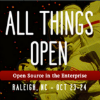It's official: Twitter is a global phenomenon, and it's hard to argue against the numbers supporting that statement. What started as a small, quasi-micro-blogging company in 2006, gained steam in 2007 with the service generating around 500,000 tweets per quarter, or roughly 1100 tweets per day, and exploded to worldwide service with a staggering 500 million tweets per day by 2013.
The idea was simple—it's a social utility where you'd openly share your status updates with your friends, and maybe others too. Today, Twitter is the source for breaking news, a necessity for product and brand promotion, a Q&A service for business customers, and yes, even a tool to organize government uprisings, not to mention still a place to share a link with a friend.
Twitter is a worldwide, open, information sharing service and repository; a mind-numbingly simple "e-voice" for the people. Now on the verge of an IPO, we managed to grab Twitter's Open Source Manager, Chris Aniszczyk, for a few questions leading up to his presentation at the All Things Open conference this year.
Read more: The open source technology behind Twitter, an interview with Chris in August 2012.

Tell us about yourself in 140 characters or less.
I might as well use my Twitter bio @cra here (although bios can be up to 160 characters): Head of Open Source at Twitter. Pragmatist. Avid Runner. Bourbon.
What are your favorite hobbies?
Our industry [the tech industry] isn’t the best known for staying in shape. This shouldn’t be a surprise when you spend most of your time sitting at your desk or on an airplane (or maybe it’s just me). These days, I find myself working to improve my running times and diving into the sport of trail running.
Trail running in Burnet, TX https://t.co/d6fWbAIM28
— Chris Aniszczyk (@cra) April 20, 2013
Your health is one of your best assets and if you take care of it, you’ll have more energy for work, life, and to hack on things. It’s as simple as that. And when you travel, all you need to pack are your running shoes to get some exercise in. No excuses!
I’m also passionate about bourbon, but we can save that for another interview.
What led you to become an engineer? Were you always into coding? How did you get involved with open source?
I was fortunate when growing up to be exposed to ZX Spectrum and video game consoles over the years. The desire to build my own video games after playing them so much put me on the path of becoming an engineer.
In terms of how I got involved in open source, I started as a consumer when I was in high school and spent time tinkering with Slackware. After Slackware, I was introduced to Gentoo and become enamored with the philosophy around portage and more importantly the active community. It was the first time I was exposed to a huge community of volunteers taking their time to answer questions on IRC and via their active forums. I’m still thankful to this day for the folks who answered my silly questions when I was learning to compile everything from scratch. I've been paying it forward ever since.
Do you have a git repo hosting service of choice? What are your other tools/services of choice?
GitHub is the defacto repo hosting service for me and where Twitter happens to open source and develop the majority of its software. It shouldn’t be a surprise as GitHub is the largest repo hosting service out there and the world's largest open source community. The folks at GitHub have done a lot to make development frictionless with pull requests and improve the life of contributors in general.
Another tool I’m fond of is Gerrit Code Review, which we heavily use at the Eclipse Foundation, but it is also used at places like Openstack and Wikimedia. It serves some different use cases than GitHub, but it’s a fantastic code review tool and integrates beautifully with git.
If you could write code only pursuant to a single open source license for the rest of your life, what would it be?
This is almost a trick question as I think it’s too simplistic to choose one license; there’s a lot of factors you have to consider from business strategy to patents to personal choice. Personally, I tend to be fond of permissive (MIT/BSD) and weak copyleft licenses (MPL/EPL), depending on what I’m doing. At Twitter, we lean towards permissive licenses, in particular the Apache Public License 2.0 because of a couple of legal niceties, such as a patent retaliation clause and strict rules around trademark usage. I also believe permissive licenses are the best when it comes to having individuals and companies adopt your software.
How would you explain open source to someone on the street?
It’s just a socialist idea and helps undermine the man. Just kidding.
To explain open source on the street, I would tell people to imagine they created an amazing chocolate chip cookie recipe and hosted a dinner party. At the dinner party, people loved the cookies so much they asked if you could share the recipe so you happily obliged:
- 2 cups flour
- ½ tsp baking soda
- ¼ tsp sea salt
- ¼ cup all-vegetable shortening
- ¼ cup honey
- 1 tbsp vanilla extract
- ½ cup dark chocolate chips
- ½ cup chopped pecans
Furthermore, folks loved the recipe so much they thought it could be improved. One of your hipster friends thinks the recipe could be improved if you added bacon, another is on the paleo diet and wants to use almond flour, while another friend wants to remove pecans because they are allergic to nuts. After tasting the bacon ingredient addition, you agree and incorporate the change into your original recipe because bacon makes everything better.
For someone with a tech background, replace the recipe with software, bacon with features, and walnuts with bug fixes. Maybe that’s a terrible analogy or too simple as open source encompasses a lot more than software these days, but you get the point. Also, for the best chocolate chip cookies I’ve ever had in my life I recommend this recipe from Blackbird Bakery.
Finally, what will your All Things Open conference talk be about (without giving too much away)?
In all honesty, I haven’t finished the talk yet so it will be somewhat of a surprise. However, I plan on covering the growth challenges we faced as we both grew as a service and a company. I’ll delve into our migration from a monolithic architecture to a more service oriented architecture and how open source helped us along the way. In particular, I’ll focus on our infrastructure and how Mesos has made our life easier.









2 Comments